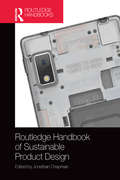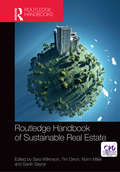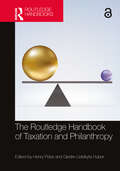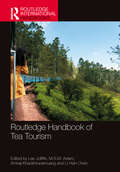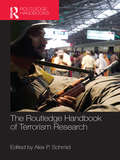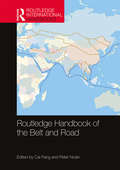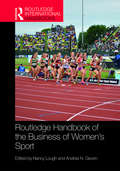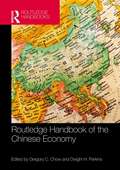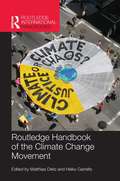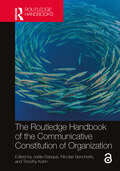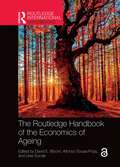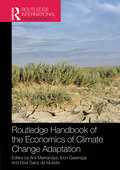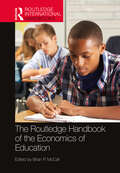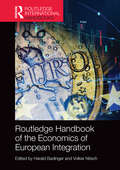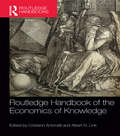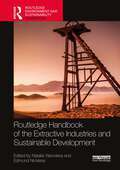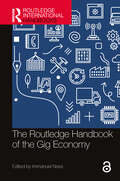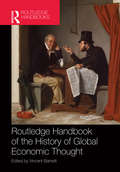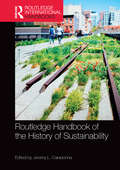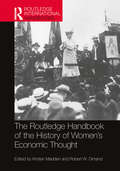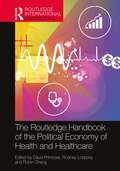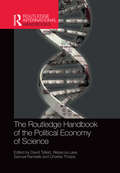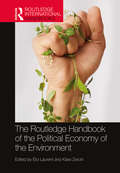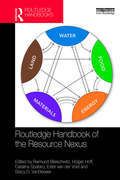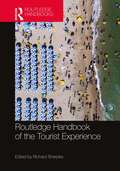- Table View
- List View
Routledge Handbook of Sustainable Product Design
by Jonathan ChapmanAs a cultivated form of invention, product design is a deeply human phenomenon that enables us to shape, modify and alter the world around us – for better or worse. The recent emergence of the sustainability imperative in product design compels us to recalibrate the parameters of good design in an unsustainable age. Written by designers, for designers,?the Routledge Handbook of Sustainable Product Design presents the first systematic overview of the burgeoning field of sustainable product design. Brimming with intelligent viewpoints, critical propositions, practical examples and rich theoretical analyses, this book provides an essential point of reference for scholars and practitioners at the?intersection of product design and sustainability. The book takes readers to the depth of our engagements with the designed world to advance the social and ecological purpose of product design as a critical twenty-first-century practice. Comprising 35 chapters across 6 thematic parts, the book’s contributors include the most significant international thinkers in this dynamic and evolving field.
Routledge Handbook of Sustainable Real Estate
by Sara Wilkinson Tim Dixon Norm Miller Sarah SayceWith the built environment contributing almost half of global greenhouse emissions, there is a pressing need for the property and real estate discipline to thoroughly investigate sustainability concerns. The Routledge Handbook of Sustainable Real Estate brings together the latest research of leading academics globally, demonstrating the nature and extent of the impact as well as suggesting means of mitigating humankind's impact and building resilience. Four sections examine the different aspects of sustainable real estate: governance and policy valuation, investment and finance management redevelopment and adaptation. Covering all land uses from residential to commercial, retail and industrial, the Routledge Handbook of Sustainable Real Estate is an exciting mixture of received wisdom and emerging ideas and approaches from both the developed and developing world. Academics, upper-level students and researchers will find this book an essential guide to the very best of sustainable real estate research.
The Routledge Handbook of Taxation and Philanthropy: The Mystery Of Transformation (Routledge International Handbooks)
by Henry Peter Giedre Lideikyte HuberThe Routledge Handbook of Taxation and Philanthropy ventures into a territory that is still widely unexplored. It contains 30 academic contributions that aim to provide a better understanding of whether, why, and how philanthropic initiatives, understood as voluntary contributions for the common good, can and should be fostered by states through tax incentives. The topic has been addressed from a multidisciplinary and multicultural perspective – covering neuroeconomics, sociology, political science, psychology, affective sciences, philosophy, behavioral economy, and law – because of its global and multifaceted nature. It also contains the OECD report on Taxation and Philanthropy released in November 2020, which was prepared in this context as a result of a collaboration with the Geneva Centre for Philanthropy of the University of Geneva. The book is divided into four sections, exploring, respectively, the justification of tax incentives for philanthropy, theoretical and empirical insights about taxes, efficiency and donor behavior in that context, and tax incentives for cross-border philanthropy and for hybrid entities and social entrepreneurship. It is believed that this volume will be a landmark yet only the beginning of a journey in which a lot remains to be studied, learned, and said.
Routledge Handbook of Tea Tourism (Routledge International Handbooks)
by Lee Jolliffe M.S.M. Aslam Amnaj Khaokhrueamuang Li-Hsin ChenThe Routledge Handbook of Tea Tourism provides comprehensive and cutting-edge insights into global tea tourism. With contributions from leading scholars and experts across 19 countries, it demonstrates the interdisciplinary nature and breadth of topics associated with global tea tourism. Tea is deeply connected to tourism through both travel and consumption. For host communities it provides an opportunity for diversification from the production and/or serving of tea while sharing cultural traditions and improving livelihoods. The Handbook is organised into five parts, with an introduction and epilogue, and the first part begins with an overview of historical and contemporary perspectives on the foundations of tea tourism. It digs into the roots of such tourism in China, the relationship of wild tea to indigenous tourism in Vietnam, heritage railways to tea tourism, and tea tourism in Africa. The second part examines sustainable tea tourism, with examples from Thailand, Turkey, Sri Lanka and India. The third part explores the management and marketing of tea tourism, highlighting tools and techniques for development and the impact of social media on the tea tourism experience. It draws on examples of tea tourism experience in diverse settings, such as the English tea room, a pearl milk tourism factory in Taiwan and a hot spring tea destination in Japan. The fourth part provides perspectives on innovation and practice in tea tourism, such as gastronomical tea tourism in Turkey, Japan and Thailand; tea cafés and community diversification in Japan; the role of GIAHS designation in tea tourism; and tea tour guiding in Iran. Finally, the fifth part provides insights on resilience in tea tourism, examining topics such as human-wildlife conflicts and the impact of the COVID-19 pandemic on the sector in both Asia and Europe. This Handbook provides a valuable resource for students and researchers, presenting a rich collection of theoretical and empirical insights, an agenda for future directions in the field and end-of-chapter discussion questions. It also serves as a useful tool for key stakeholders, aiming to increase interaction between academia and industry, encouraging the development of sustainable responsible tea tourism that benefits local communities on a global basis.
The Routledge Handbook of Terrorism Research
by Alex P. SchmidThis major new Handbook synthesises more than two decades of scholarly research, and provides a comprehensive overview of the field of terrorism studies. The content of the Handbook is based on the responses to a questionnaire by nearly 100 experts from more than 20 countries as well as the specific expertise and experience of the volume editor and the various contributors. Together, they guide the reader through the voluminous literature on terrorism, and propose a new consensus definition of terrorism, based on an extensive review of existing conceptualisations. The work also features a large collection of typologies and surveys a wide range of theories of terrorism. Additional chapters survey terrorist databases and provide a guide to available resources on terrorism in libraries and on the Internet. It also includes the most comprehensive World Directory of Extremist, Terrorist and other Organizations associated with Guerrilla Warfare, Political Violence, Protest and Organized- and Cyber-Crime. The Routledge Handbook of Terrorism Research will be an essential work of reference for students and researchers of terrorism and political violence, security studies, criminology, political science and international relations, and of great interest to policymakers and professionals in the field of counter-terrorism.
Routledge Handbook of the Belt and Road (Routledge International Handbooks)
by Cai Fang Peter NolanChinese President Xi Jinping announced the Belt and Road Initiative (BRI) in 2013, a development strategy involving infrastructure development and investments in countries in Europe, Asia and Africa. It has rapidly turned into action, reflected in the establishment of a series of international cooperation mechanisms, landing of cooperation projects, and harvest of some early results. The influence is huge, and controversy is not unexpected. As one of the most frequently mentioned concepts in the official media, how does the “bid to enhance regional connectivity” construct a unified large market through cultural exchange and integration in practice? What is the status quo of building an innovative pattern with capital inflows, talent pool, and technology database? Routledge Handbook of the Belt and Road is an initial review of the theory and practice of BRI, and is the first handbook of its kind. Contributors are leading subject researchers, aiming to reflect the original intentions and principles, history and current situation, basic knowledge and latest studies. A total of 117 entries related to the BRI have been included, organised into 12 clear parts covering the following key topics: • China’s reform and opening-up and formation of the BRI• Backstory, concept and framework• The five roads and six economic corridors• Foreign affairs with Chinese characteristics• International action plans relevant and similar to the BRI• Case studies of the BRI implementation and promotion Routledge Handbook of the Belt and Road is an essential guide for researchers, practitioners and observers involved in the BRI construction. Global think tanks, media practitioners and universities will also find the book a useful reference.
Routledge Handbook of the Business of Women's Sport (Routledge International Handbooks)
by Nancy Lough Andrea N. GeurinCombining knowledge from sport management, marketing, media, leadership, governance, and consumer behavior in innovative ways, this book goes further than any other in surveying current theory and research on the business of women’s sport around the world, making it an unparalleled resource for all those who aspire to work in, or understand, women’s sport. Featuring international perspectives, with authors from North America, South America, Europe, Asia, and Oceania, and insightful, in-depth profiles of real leaders within different sectors of women's sport in the global sport industry, the Routledge Handbook of the Business of Women's Sport offers an integrated understanding of the ways traditional media and social media impact both the understanding and advancement of women’s sport properties, businesses, teams, and athletes. Innovative case studies show how societal issues such as gender, power, and framing impact the business of women’s sports and those who work in women’s sport. An essential reference for any researcher or advanced student with an interest in women’s sport or women in business, and useful supplementary reading for researchers and advanced students working in sport business, sport management, mainstream business and management, or women’s studies.
Routledge Handbook of the Chinese Economy
by Dwight H. Perkins Gregory C. ChowChina's rapid rise to become the world's second largest economy has resulted in an unprecedented impact on the global system and an urgent need to understand the more about the newest economic superpower. The Routledge Handbook of the Chinese Economy is an advanced-level reference guide which surveys the current economic situation in China and its integration into the global economy. An internationally renowned line-up of scholars contribute chapters on the key components of the contemporary economy and their historical foundations. Topics covered include: the history of the Chinese economy from ancient times onwards; economic growth and development; population, the labor market, income distribution, and poverty; legal, political, and financial institutions; and foreign trade and investments. Offering a cutting-edge overview of the Chinese economy, the Handbook is an invaluable resource for academics, researchers, economists, graduate, and undergraduate students studying this ever-evolving field.
Routledge Handbook of the Climate Change Movement (Routledge Environment and Sustainability Handbooks)
by Matthias Dietz Heiko GarreltsThis handbook provides a comprehensive overview of the growing transnational climate movement. A dual focus on climate politics and civil society provides a hitherto unavailable broad and systematic analysis of the current global movement, highlighting how its dynamic and diverse character can play an important role in environmental politics and climate protection. The range of contributors, from well-known academics to activist-scholars, look at climate movements in the developed and developing world, north and south, small and large, central and marginal. The movement is examined as a whole and as single actors, thereby capturing its scope, structure, development, activities and influence. The book thoroughly addresses theoretical approaches, from classic social movement theory to the influence of environmental justice frames, and follows this with a systematic focus on regions, specific NGOs and activists, cases and strategies, as well as relations with peripheral groups. In its breadth, balance and depth, this accessible volume offers a fresh and important take on the question of social mobilization around climate change, making it an essential text for advanced undergraduates, postgraduate students and researchers in the social sciences.
The Routledge Handbook of the Communicative Constitution of Organization (Routledge Studies in Communication, Organization, and Organizing)
by Joëlle BasqueThis Handbook offers state of the art scholarship on the perspective known as the Communicative Constitution of Organization (CCO). Offering a unique outlook on how communication accounts for the emergence, change, and continuity of organizations and organizing practices, this Handbook systematically exposes the theoretical and methodological underpinnings of CCO, displays its empirical diversity, and articulates its future trajectory. Placing communication firmly at the centre of the organizational equation, an international team of expert authors covers: The key theoretical inspirations and the main themes of the field The debates that animate the CCO community CCO’s methodological approaches How CCO handles classic management themes Practical applications Offering a central statement of CCO’s contributions to the fields of organization studies, communication, and management, this Handbook will be of interest to organization studies and communication scholars, faculty, and graduate and advanced undergraduate students, as well as anyone associated with CCO theorizing seeking a comprehensive overview of the theoretical, methodological, and practical tenets of this growing area.
The Routledge Handbook of the Economics of Ageing (Routledge International Handbooks)
by David E. Bloom Alfonso Sousa-Poza Uwe SundeAgeing populations pose some of the foremost global challenges of this century. Drawing on an international pool of scholars, this cutting-edge Handbook surveys the micro, macro and institutional aspects of the economics of ageing. Structured in seven parts, the volume addresses a broad range of themes, including health economics, labour economics, pensions and social security, generational accounting, wealth inequality and regional perspectives. Each chapter combines a succinct overview of the state of current research with a sketch of a promising future research agenda. This Handbook will be an essential resource for advanced students, researchers and policymakers looking at the economics of ageing across the disciplines of economics, demography, public policy, public health and beyond.
Routledge Handbook of the Economics of Climate Change Adaptation: Routledge Handbook Of The Economics Of Climate Change Adaptation (Routledge International Handbooks)
by Anil Markandya Ibon Galarraga Elisa Sainz de MurietaClimate change is one of the greatest challenges facing human kind owing to the great uncertainty regarding future impacts, which affect all regions and many ecosystems. Many publications deal with economic issues relating to mitigation policies, but the economics of adaptation to climate change has received comparatively little attention. However, this area is is critical and a central pillar of any adaptation strategy or plan and is the economic dimension, which therefore merits the increase in attention it is receiving. This book deals with the difficulties that face the economics of adaptation. Critical issues include: uncertainty; baselines; reversibility, flexibility and adaptive management; distributional impacts; discount rates and time horizons; mixing monetary and non-monetary evaluations and limits to the use of cost-benefit analysis; economy-wide impacts and cross-sectoral linkages. All of these are addressed in the book from the perspective of economics of adaptation. Other dimensions of adaptation are also included, such as the role of low- and middle-income countries, technology and the impacts of extreme events. This timely book will prove essential reading for international researchers and policy makers in the fields of natural resources, environmental economics and climate change.
The Routledge Handbook of the Economics of Education (Routledge International Handbooks)
by Brian P. McCallThe economics of education is a burgeoning area of study, employing increasingly sophisticated analytical tools to answer questions with high societal impact. Thus, the aim of this handbook is to provide readers with an up-to-date overview of the current state of the field of the economics of education and its main areas of research. This comprehensive handbook provides an authoritative overview of key theoretical and policy areas, covering topics like econometric methods for education economics, returns to education, competition in education provision, education and economic growth, and education and inequality. It reviews the current state of research from early childhood through postgraduate education as well as adult education and life-long learning. Offering a truly international perspective, the handbook benefits from a global group of contributors and attention to both developed and developing country contexts. The Routledge Handbook of the Economics of Education will be a valuable resource for advanced students, researchers, and policymakers across economics, education, and public policy.
Routledge Handbook of the Economics of European Integration (Routledge International Handbooks)
by Volker Nitsch Harald BadingerRoutledge Handbook of the Economics of European Integration provides readers with a brief but comprehensive overview of topics related to the process of European integration in the post-World War II period. Its short chapters reflect the most up-to-date and concise research, written by a collective of experts on their own subjects. The aim of this book is twofold. Firstly, the text illustrates the broad and diverse range of issues associated with European integration, and lastly, the key approaches and findings are summarised. Since institutional integration in Europe is an ongoing process, with possibly frequent and sometimes rapid changes, the chapters are intended to focus on the key features of the economic analyses of these topics. A wide and diverse set of economic issues is of direct relevance for European integration. These topics cover various fields, ranging from the history of the European Economic and Monetary Union, EU Trade Policy and the stability of international trade, single market issues over fiscal, monetary and other policies, the crisis that faces the Euro area, and institutions such as EU Council of Ministers. Not surprisingly, many of these issues have also been analysed from a European perspective. This handbook is designed to provide students, researchers, the public and policy makers with ready and accessible knowledge of issues related to European integration and will provide the definitive overview of research in the area.
Routledge Handbook of the Economics of Knowledge (Routledge International Handbooks)
by Cristiano Antonelli Albert N. LinkThe Routledge Handbook of the Economics of Knowledge provides a comprehensive framework to integrate the advancements over the last 20 years in the analysis of technological knowledge as an economic good, and in the static and dynamic characteristics of its generation process. There is a growing consensus in the field of economics that knowledge, technological knowledge in particular, is one of the most relevant resources of wealth, yet it is one of the most difficult and complex activities to understand or even to conceptualize. The economics of knowledge is an emerging field that explores the generation, exploitation, and dissemination of technological knowledge. Technological knowledge cannot any longer be regarded as a homogenous good that stems from standardized generation processes. Quite the opposite, technological knowledge appears more and more to be a basket of heterogeneous items, resources, and even experiences. All of these sources, which are both internal and external to the firm, are complementary, as is the interplay between a bottom-up and top-down generation processes. In this context, the interactions between the public research system, private research laboratories, and various networks of learning processes, within and among firms, play a major role in the creation of technological knowledge. In this Handbook special attention is given to the relationship among technological knowledge and both upstream scientific knowledge and related downstream resources. By addressing the antecedents and consequences of technological knowledge from both an upstream and downstream perspective, this Handbook will become an indispensable tool for scholars and practitioners aiming to master the generation and the use of technological knowledge.
Routledge Handbook of the Extractive Industries and Sustainable Development (Routledge Environment and Sustainability Handbooks)
by Natalia YakovlevaThe Routledge Handbook of the Extractive Industries and Sustainable Development provides a cutting-edge, comprehensive overview of current trends, challenges and opportunities for metal and mineral production and use, in the context of climate change and the United Nations Sustainable Development Agenda 2030. Minerals and metals are used throughout the world in manufacturing, construction, infrastructure, production of electronics and consumer goods. Alongside this widespread use, extraction and processing of mineral resources take place in almost every nation at varying scales, both in developing countries and major developed nations. The chapters in this interdisciplinary handbook examine the international governance mechanisms regulating social, environmental and economic implications of mineral resource extraction and use. The original contributions, from a range of scholars, examine the relevance of the mining industry to the United Nations Sustainable Development Goals (SDGs), reviewing important themes such as local communities Indigenous peoples, gender equality and fair trade, showing how mining can influence global sustainable development. The chapters are organised into three sections: Global Trends in Mineral Resources Consumption and Production; Technology, Minerals and Sustainable Development; and Management of Social, Environmental and Economic Issues in the Mining Industry. This handbook will serve as an important resource for students and researchers of geology, geography, earth science, environmental studies, engineering, international development, sustainable development and business management, among others. It will also be of interest to professionals in governmental, international and non-governmental organisations that are working on issues of resource governance, environmental protection and social justice.
The Routledge Handbook of the Gig Economy (Routledge International Handbooks)
by Immanuel NessResearch on the growth of the precarious economy is of signifi cant interest as the economy increasingly becomes dependent on gig work. However, as platform and automated service work has grown, there remains a chasm in understanding the key aspects of digital labour. This handbook presents comprehensive theoretical, empirical, and historical accounts of the political economy of informal work from the late 20th century to the present. It examines the rich and varied analysis and critique of the informalisation of work, focusing on its most signifi cant theories, intellectual traditions, and authors. It highlights the political, social, cultural, and developmental impact of the deterioration of employment in the Global North and Global South, as well as the extreme threat posed to the planet by the growth of contingent work, poverty, and enduring and increasing inequalities produced and reproduced by the reformation of capitalism in the contemporary age of neoliberal capitalism. The period from the 1980s to the present is marked by the expanded extraction of surplus value from workers through the creation of non-standard jobs and the restructuring of work. A central component of the restructuring of work is the extension of gig employment through the development of algorithmic platforms which direct labourers to perform discrete tasks. This is a definitive collection, representing the primary reference work, contributing to our understanding of the subject. The book is written and presented in a clear manner, accessible to scholars and researchers of international political economy, labour economics, and sociology who are eager for new research examining this phenomenon, as well as specialists in the field of labour relations. Chapter 11 of this book is freely available as a downloadable Open Access PDF under a Creative Commons Attribution-Non Commercial-No Derivatives 4.0 license available at http://www.taylorfrancis.com.
Routledge Handbook of the History of Global Economic Thought (Routledge International Handbooks)
by Vincent BarnettThe Routledge Handbook of the History of Global Economic Thought offers the first comprehensive overview of the long-run history of economic thought from a truly international perspective. Although globalization has facilitated the spread of ideas between nations, the history of economics has tended to be studied either thematically (by topic), in terms of different currents of thought, or individually (by economist). Work has been published in the past on the economic thought traditions of specific countries, but this pioneering volume is unique in offering a wide-ranging comparative account of the development of economic ideas and philosophies on the international stage. The volume brings together leading experts on the development of economic ideas from across the world in order to offer a truly international comparison of the economics within nation-states. Each author presents a long-term perspective on economics in their region, allowing global patterns in the progress of economic ideas over time to be identified. The specially commissioned chapters cover the vast sweep of the history of economics across five world regions, including Europe (England, Scotland, Ireland, Italy Greece, Spain, Portugal, Germany, Sweden, Russia and the Ukraine), the Americas (the USA, Canada, Mexico and Central America, Spanish-Speaking South America, Brazil and the Caribbean), the Middle East (Turkey, Israel, Arab-Islamic Economics, Persia/Iran, North Africa), Africa (West Africa, Southern Africa, Mozambique and Angola), and the Asia-Pacific Region (Australia and New Zealand, China, Southeast Asia, the Asian Tigers, India.) This rigorous, ambitious and highly scholarly volume will be of key interest to students, academics, policy professionals and to interested general readers across the globe.
Routledge Handbook of the History of Sustainability (Routledge Environment and Sustainability Handbooks)
by Jeremy L. CaradonnaThe Routledge Handbook of the History of Sustainability is a far-reaching survey of the deep and contemporary history of sustainability. This innovative resource will help to define the history of sustainability as an identifiable field. It provides a unique resource for advanced undergraduates, graduate students, and scholars, and delivers essential context for understanding the current state and future path of the sustainability movement. The history of sustainability is an increasingly important domain within the discipline of history, which draws on an interdisciplinary set of fields, ranging from energy studies, transportation, and urbanism to environmental history, economics, and philosophy. Key sections in this handbook cover the historiography of sustainability, resilience and collapse in historical societies, the deep roots of sustainability (seventeenth century to nineteenth century), the recent history of sustainability (twentieth century to present), and core issues and key debates in sustainability. This handbook is an invaluable research and teaching tool for those interested in the history and development of sustainability and an essential resource for the many sustainability studies programs that now exist in the world's universities.
Routledge Handbook of the History of Women’s Economic Thought (Routledge International Handbooks)
by Kirsten Madden Robert W DimandThe marginalization of women in economics has a history as long as the discipline itself. Throughout the history of economics, women contributed substantial novel ideas, methods of inquiry, and analytical insights, with much of this discounted, ignored, or shifted into alternative disciplines and writing outlets. This handbook presents new and much-needed analytical research of women’s contributions in the history of economic thought, focusing primarily on the period from the 1770s into the beginning of the 21st century. Chapters address the institutional, sociological and historical factors that have influenced women economists’ thinking, and explore women’s contributions to economic analysis, method, policies and debates. Coverage is international, moving beyond Europe and the US into the Arab world, China, India, Japan, Latin America, Russia and the Soviet Union, and sub-Saharan Africa. This new global perspective adds depth as well as scope to our understanding of women’s contribution to the history of economic thought. The book offers crucial new insights into previously underexplored work by women in the history of economic thought, and will prove to be a seminal volume with relevance beyond that field, into women’s studies, sociology, and history.
The Routledge Handbook of the Political Economy of Health and Healthcare (Routledge International Handbooks)
by David Primrose Rodney Loeppky Robin ChangThis handbook provides a comprehensive and critical overview of the gamut of contemporary issues around health and healthcare from a political economy perspective. Its contributions present a unique challenge to prevailing economic accounts of health and healthcare, which narrowly focus on individual behaviour and market processes. Instead, the capacity of the human body to reach its full potential and the ability of society to prevent disease and cure illness are demonstrated to be shaped by a broader array of political economic processes. The material conditions in which societies produce, distribute, exchange, consume, and reproduce – and the operation of power relations therein – influence all elements of human health: from food consumption and workplace safety, to inequality, healthcare and housing, and even the biophysical conditions in which humans live.This volume explores these concerns across five sections. First, it introduces and critically engages with a variety of established and cutting-edge theoretical perspectives in political economy to conceptualise health and healthcare – from neoclassical and behavioural economics, to Marxist and feminist approaches. The next two sections extend these insights to evaluate the neoliberalisation of health and healthcare over the past 40 years, highlighting their individualisation and commodification by the capitalist state and powerful corporations. The fourth section examines the diverse manifestation of these dynamics across a range of geographical contexts. The volume concludes with a section devoted to outlining more progressive health and healthcare arrangements, which transcend the limitations of both neoliberalism and capitalism.This volume will be an indispensable reference work for students and scholars of political economy, health policy and politics, health economics, health geography, the sociology of health, and other health-related disciplines.
The Routledge Handbook of the Political Economy of Science (Routledge International Handbooks)
by David Tyfield Rebecca Lave Samuel Randalls Charles ThorpeThe political economy of research and innovation (R&I) is one of the central issues of the early twenty-first century. ‘Science’ and ‘innovation’ are increasingly tasked with driving and reshaping a troubled global economy while also tackling multiple, overlapping global challenges, such as climate change or food security, global pandemics or energy security. But responding to these demands is made more complicated because R&I themselves are changing. Today, new global patterns of R&I are transforming the very structures, institutions and processes of science and innovation, and with it their claims about desirable futures. Our understanding of R&I needs to change accordingly. Responding to this new urgency and uncertainty, this handbook presents a pioneering selection of the growing body of literature that has emerged in recent years at the intersection of science and technology studies and political economy. The central task for this research has been to expose important but consequential misconceptions about the political economy of R&I and to build more insightful approaches. This volume therefore explores the complex interrelations between R&I (both in general and in specific fields) and political economies across a number of key dimensions from health to environment, and universities to the military. The Routledge Handbook of the Political Economy of Science offers a unique collection of texts across a range of issues in this burgeoning and important field from a global selection of top scholars. The handbook is essential reading for students interested in the political economy of science, technology and innovation. It also presents succinct and insightful summaries of the state of the art for more advanced scholars.
The Routledge Handbook of the Political Economy of the Environment (Routledge International Handbooks)
by Éloi Laurent Klara ZwicklFeaturing a stellar international cast list of leading and cutting-edge scholars, The Routledge Handbook of the Political Economy of the Environment presents the state of the art of the discipline that considers ecological issues and crises from a political economy perspective. This collective volume sheds new light on the effect of economic and power inequality on environmental dynamics and, conversely, on the economic and social impact of environmental dynamics. The chapters gathered in this handbook make four original contributions to the field of political economy of the environment. First, they revisit essential concepts and methods of environmental economics in the light of their political economy. Second, they introduce readers to recent theoretical and empirical advances in key issues of political economy of the environment with a special focus on the relationship between inequality and environmental degradation, a nexus that has dramatically come into focus with the COVID crisis. Third, the authors of this handbook open the field to its critical global and regional dimensions: global issues, such as the environmental justice movement and inequality and climate change as well as regional issues such as agriculture systems, air pollution, natural resources appropriation and urban sustainability. Fourth and finally, the work shows how novel analysis can translate into new forms of public policy that require institutional reform and new policy tools. Ecosystems preservation, international climate negotiations and climate mitigation policies all have a strong distributional dimension that chapters point to. Pressing environmental policy such as carbon pricing and low-carbon and energy transitions entail numerous social issues that also need to be accounted for with new analytical and technological tools. This handbook will be an invaluable reference, research and teaching tool for anyone interested in political economy approaches to environmental issues and ecological crises.
Routledge Handbook of the Resource Nexus (Routledge Environment and Sustainability Handbooks)
by Raimund Bleischwitz Holger Hoff Catalina Spataru Ester Van Der Voet Stacy D. VanDeveerIn recent years the concept of the resource "nexus" has been both hotly debated and widely adopted in research and policy circles. It is a powerful new way to understand and better govern the myriad complex relationships between multiple resources, actors and their security concerns. Particular attention has been paid to water, energy and food interactions, but land and materials emerge as critical too. This comprehensive handbook presents a detailed review of current knowledge about resource nexus-related frameworks, methods and governance, including a broad set of inter-disciplinary perspectives. Written by an international group of scholars and practitioners, the volume focuses on rigorous research, including tools, methods and modelling approaches to analyse resource use patterns across societies and scales from a "nexus perspective". It also provides numerous examples from political economy to demonstrate how resource nexus frameworks can illuminate issues such as land grabs, mining, renewable energy and the growing importance of economies such as China, as well as to propose lessons and outlooks for sound governance. The volume seeks to serve as an essential reference text, source book and state-of-the-art, science-based assessment of this increasingly important topic – the resource nexus – and its utility in efforts to enhance sustainability of many kinds and implement the United Nations Sustainable Development Goals in an era of environmental and geopolitical change.
Routledge Handbook of the Tourist Experience
by Richard SharpleyRoutledge Handbook of the Tourist Experience offers a comprehensive synthesis of contemporary research on the tourist experience. It draws together multidisciplinary perspectives from leading tourism scholars to explore emergent tourist behaviours and motivations. This handbook provides up-to-date, critical discussions of established and emergent themes and issues related to the tourist experience from a primarily socio-cultural perspective. It opens with a detailed introduction which lays down the framework used to examine the dynamic parameters of the tourist experience. Organised into five thematic sections, chapters seek to build and enhance knowledge and understanding of the significance and meaning of diverse elements of the tourist experience. Section 1 conceptualises and understands the tourist experience through an exploration of conventional themes such as tourism as authentic and spiritual experience, as well as emerging themes such as tourism as an embodied experience. Section 2 investigates the new, developing tourist demands and motivations, and a growing interest in the travel career. Section 3 considers the significance, motives, practices and experiences of different types of tourists and their roles such as the tourist as photographer. Section 4 discusses the relevance of ‘place’ to the tourist experience by exploring the relationship between tourism and place. The last section, Section 5, scrutinises the role of the tourist in creating their experiences through themes such as ‘transformations in the tourist role’ from passive receiver of experiences to co-creator of experiences, and ‘external mediators in creating tourist experiences'. This handbook is the first to fill a notable gap in the tourism literature and collate within a single volume critical insights into the diverse elements of the tourist experience today. It will be of key interest to academics and students across the fields of tourism, hospitality management, geography, marketing and consumer behaviour.
